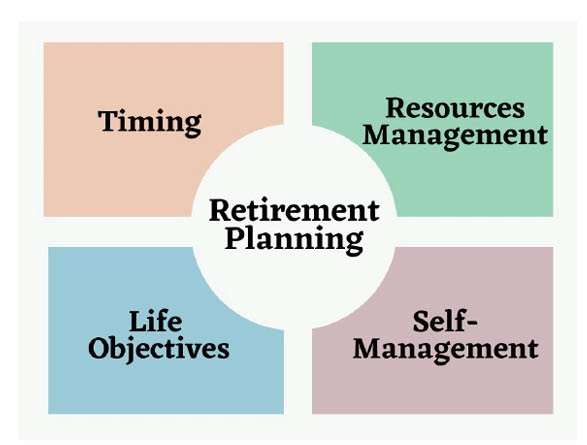In introducing this column, I mentioned that retirement planning comprises handling issues that revolve around having life objectives, self-management, managing resources, and timing. A major activity in resources management is financial planning, which, beginning today, shall be our subject for the next few weeks.
There are a few things we should think through and act upon in planning our finances prior to and for life in retirement. These are:
- Where are we now in terms of both our financial situation and the time we have left to our retirement,
- What lifestyle do we want to have in retirement and, consequently, what financial capacity should we have by the time we will be going into retirement,
- Based on 1 and 2 above, we will then need to roll our sleeves and work smart and hard towards filling up any gaps gradually over the time that we have.
Where are we? Where we are on the retirement time scale will influence what we may be able to do, at least to some extent. As we mentioned earlier, a young person starting their career in employment as a twenty-five-year-old will need to first begin to address certain basic requirements in life. These might include renting an apartment to live in; buying their first car; getting married to the love of their life and raising a family. For those starting their business around that age, their initial focus might be for their business to survive and then begin to grow. In either case, most people in the age band of twenty-five to thirty-five might have little luxury of doing much towards financial planning for their retirement which might seem an ‘eternity away’ anyway. At this stage, it will be sufficient for them to begin to build and ‘stabilise’ themselves and what they may be engaged in. Nonetheless, this is an important age band within which wise individuals can set the tone for prudent financial practices for life.
- Jigawa monarch rapes, infects girl with HIV
- Criminals from Ondo unleashing terror on our land — Ogun dep gov
Those in the mid-part of the pre-retirement phase, let us say between ages thirty-five and fifty-five, should be aggressive in building assets that will provide income and also grow. This is important because at that phase people do get good opportunities but may waste them in the unreal belief that they will last forever. They don’t. Crucial and substantial cash outlays such as payments for children’s education should, as much as possible, be settled before retirement. If there will still be younger children in school at the time of retirement, funds should be set aside specifically for their education or arrangements made to that effect.
Those in the later pre-retirement years, perhaps aged between fifty-five and sixty, should begin to consolidate their finances for retirement and smooth out the rough edges of their hitherto ‘aggressive’ planning philosophies. This means beginning to protect what they have, scaling down their risk affinities, and sensitising those close to them on their impending retirement. But these do not in any way suggest that persons above sixty should not continue at full throttle. That is an individual choice to make.
Another important component of establishing ‘where we are’ is continuously knowing our health status. First, our health situation can really determine what we can do and for how long. Second, we can help ourselves by taking timely actions where there is a need. Third, a health plan is an integral part of retirement planning that may require funds of its own.
What do we have? Parallel to knowing where we are on the timeline toward our retirement and what we should be doing there, we will need to establish what we are making in income and what we have in assets and liabilities.
In my retirement planning training programmes, I often conduct a simple exercise in which I ask participants to tell me who amongst them knows how much they spend monthly on groceries, fuel for car(s) and generator(s), eating out, social support to extended family and community members, etc. Unsurprisingly, only about six per cent of participants respond in the affirmative. If I were to ask participants to tell us if they know what their net worth was at the end of the previous month, chances are that not more than six per cent would, either!
But not knowing how much we spend and what our net worth is is antithetical to every financial planning philosophy and activity. That is, however, the sad reality of many of our people, perhaps including you, the reader! Many people in the middle and lower classes earn and get as much as they can for the month, spend as much as things come up, and then close the month with some surplus or a deficit and roll over into the following month. ‘Simple’. This is fatalistic, dangerous, and not the way to go into retirement.
Knowing what we make monthly, what we spend on and what we own is empowering to the extent that we will see gaps that we may need to fill, perhaps wastages that should be eliminated, and/or opportunities that we can seize because of certain assets that we have and which can be leveraged upon.
Establishing where we are in time towards our retirement and financially in terms of what we earn, spend on, and own are the first two legs of the tripod on which planning our finances would rest. Next week we will take up the third leg, which is about ‘where we want to get to’.




